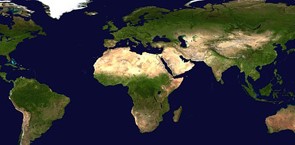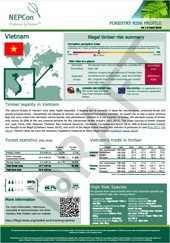Global Forest Risk Assessments: FSC announces 33 new countries in pipeline
FSC’s ambitious project to map the global risk of unacceptable forest activities has reached a new milestone. With the first 20 countries almost completed, FSC now continues with 33 more. China and Indonesia are among the next countries coming into the spotlight.
FSC is moving on to the second round of developing Controlled Wood (CW) National Risk Assessments. As FSC has prioritised countries according to their importance for FSC CW supplies, the risk assessments will soon cover most major forest countries.

 The development of the national risk assessments is a comprehensive project, which aims to provide a sound information basis for companies sourcing controlled wood.
The development of the national risk assessments is a comprehensive project, which aims to provide a sound information basis for companies sourcing controlled wood.
The project is part of FSC’s ongoing revision of the Controlled Wood system. In 2015, FSC completed draft risk assessments of the top 20 countries for sourcing Controlled Wood.
“FSC does not only provide a risk evaluation, which will be mandatory under FSC’s CW system. They plan to go one step further and include recommended ways of tackling the risks,” states NEPCon forest legality expert Alexandra Banks.
“This set of analyses will be a great asset for the FSC scheme and for companies sourcing from high-impact countries such as China and Indonesia,” says Ms Banks.
The process also involves stakeholder consultation on risk assessment for each country. These consultations are conducted by FSC, based on the draft analysis prepared by national working groups or consultants.
Added vale of FSC's open approach
 Ms Banks also stresses the value of the project in terms of making research data available for other stakeholders. “I really appreciate FSC’s open approach to data sharing. It enables others to build further on their results, creating added sustainability value,” she says.
Ms Banks also stresses the value of the project in terms of making research data available for other stakeholders. “I really appreciate FSC’s open approach to data sharing. It enables others to build further on their results, creating added sustainability value,” she says.
The impact of FSC's risk assessments extends far beyond FSC certicate holders. Today, the five types of unacceptable forest management used in FSC’s CW system are explicitly covered in many private procurement policies and in financial sector investment guidelines. Other certification schemes, such as PEFC and the Sustainable Biomass Partnership, have adopted similar requirements.
 In addition, the CW Category 1 (forest legality) mirrors the definition used in the EU Timber Regulation (EUTR). The CW risk evaluations for this category can therefore be used directly by EU forest product importers facing due diligence obligations under the EUTR.
In addition, the CW Category 1 (forest legality) mirrors the definition used in the EU Timber Regulation (EUTR). The CW risk evaluations for this category can therefore be used directly by EU forest product importers facing due diligence obligations under the EUTR.
NEPCon is turning the data collected through FSC’s CW risk assessment project into practical guidance for companies looking to source legal timber under a due diligence regime. Beyond the FSC project, NEPCon has so far launched forestry risk profiles focusing on timber legality for Cameroon, Brazil, Myanmar, Vietnam and Malaysia. Several additional profiles are under way.
“Our profiles build on the results of the FSC risk assessments as one of the key sources of data and information about timber legality risk,” says Ms Bank. “They are designed to offer an easy overview of key risk related information that can be directly used in due diligence approaches.”
Find Controlled Wood Risk Assessments
To view current risk assessments and their status, go to FSC’s CW Risk Assessment database. Note that for some countries only some categories are approved by FSC. For example, in the case of South Africa, the risk assessments for CW categories 1,2 and 5 have been completed, whilst assessment for category 3 and 4 is still on-going.
> Read more about Controlled Wood and CW risk assessment at FSC’s website
Disclaimer: NEPCon has agreed with FSC to evaluate the risk of three CW categories of unacceptable timber: Illegally harvested timber, wood from areas where forest is converted to other land uses (from a legal perspective) and wood from areas containing genetically modified trees. In addition, NEPCon will evaluate the risk related to damage of high conservation values for 19 countries.
NEPCon is conducting similar legality risk assessment for additional countries, funded by the EU and the UK government’s Department for International Development (DFID), as well as risk assessment for forest impact commodities such as palm oil, soy and cattle funded by Danida. Finally, NEPCon has conducted risk assessments for key woody biomass sourcing countries on behalf of the Sustainable Biomass Partnership.



